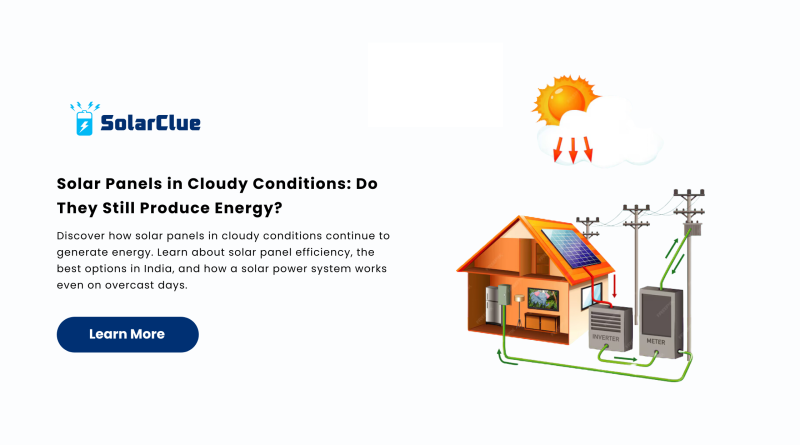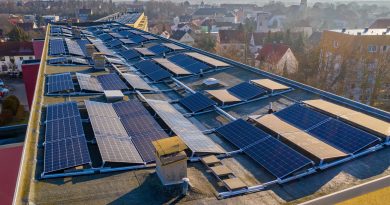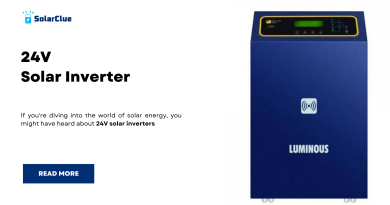Solar Panels in Cloudy Conditions: Do They Still Produce Energy?
Many homeowners wonder if solar panels can still generate electricity on cloudy days. While direct sunlight boosts efficiency, modern solar power systems are designed to function even in diffused light. Whether you’re investing in the best solar panels in India or looking for cost-effective solutions, it’s essential to understand how weather conditions impact performance. Let’s explore how solar energy production continues even when the sky is overcast.
Table of Contents
- 1 How Do Solar Panels Work on Cloudy Days?
- 2 Factors Affecting Solar Panel Efficiency on Cloudy Days
- 3 How Much Energy Do Solar Panels Generate in Cloudy Conditions?
- 4 Is Investing in Solar Panels Worth It for Cloudy Regions?
- 5 Cost Considerations: Solar Panel Price vs. Performance
- 6 Best Solar Panels in India for Cloudy Weather
- 7 Tips to Maximize Solar Panel Efficiency on Cloudy Days
- 8 Conclusion
- 9 FAQs
- 9.1 1. Can solar panels generate electricity on rainy days?
- 9.2 2. How can I improve solar panel efficiency in cloudy weather?
- 9.3 3. Do monocrystalline panels work better in cloudy conditions?
- 9.4 4. Is a solar power system cost-effective in areas with frequent cloud cover?
- 9.5 5. What happens if my solar panels don’t get enough sunlight?
How Do Solar Panels Work on Cloudy Days?
Solar panels rely on photovoltaic (PV) cells to convert sunlight into electricity. But even when the sun is hidden behind clouds, these panels can still absorb diffused light. Advanced solar panels for home use high-efficiency monocrystalline or polycrystalline technology, ensuring some power generation even in low-light conditions.
Factors Affecting Solar Panel Efficiency on Cloudy Days
Several factors influence how well a solar power system performs in cloudy weather:
1. Type of Solar Panels
Not all solar panels perform the same way under low light. High-quality monocrystalline panels typically perform better in cloudy conditions than polycrystalline ones. Investing in the best solar panels in India can significantly improve energy output even on overcast days.
2. Cloud Density and Sunlight Penetration
Thicker cloud cover reduces the amount of sunlight that reaches the panels, decreasing energy production. However, even during heavy cloud cover, some UV rays penetrate, allowing panels to function at reduced efficiency.
3. Temperature Effects on Solar Panel Efficiency
Interestingly, cooler temperatures on cloudy days can improve solar panel efficiency. Unlike scorching hot days, where excessive heat can reduce performance, cloudy conditions sometimes enhance energy conversion.
How Much Energy Do Solar Panels Generate in Cloudy Conditions?
On average, solar panels in cloudy conditions produce between 10% to 25% of their maximum capacity. Locations with frequent cloudy weather but high annual sunshine hours, like Bangalore or Pune, still benefit significantly from solar energy.
Is Investing in Solar Panels Worth It for Cloudy Regions?
Absolutely! Even in regions with frequent cloud cover, installing a solar power system remains a smart investment. Battery storage solutions help retain energy generated during sunny periods for later use, ensuring uninterrupted power supply.
Cost Considerations: Solar Panel Price vs. Performance
When considering solar panel price, remember that higher efficiency panels may cost more but provide better performance, even in cloudy weather. Investing in top-rated solar panels for home with enhanced low-light performance can maximize long-term savings.
Best Solar Panels in India for Cloudy Weather
Some of the best solar panels in India for low-light conditions include:
1. Tata Power Solar Panels – Known for high efficiency and reliability
2. Loom Solar Panels – Great for urban rooftops with partial shading
3. Waaree Solar Panels – Cost-effective and widely available
4. Adani Solar Panels – Premium quality with excellent low-light performance
Tips to Maximize Solar Panel Efficiency on Cloudy Days
1. Opt for High-Efficiency Panels – Look for monocrystalline or PERC technology.
2. Keep Panels Clean – Dust and dirt can further reduce energy output.
3. Use a Battery Storage System – Store excess energy for later use.
4. Ensure Proper Panel Positioning – Adjust tilt for maximum sun exposure.
Conclusion
Even in cloudy weather, solar panels continue to generate electricity, making them a viable solution for most regions. Investing in the best solar panels in India and understanding solar panel efficiency in different conditions ensures long-term benefits. Whether you’re concerned about solar panel price or efficiency, modern advancements make solar energy a reliable power source in any climate.
FAQs
1. Can solar panels generate electricity on rainy days?
Yes! While production is lower, solar panels for home still capture diffused light, ensuring some power generation.
2. How can I improve solar panel efficiency in cloudy weather?
Invest in high-efficiency solar panels, maintain regular cleaning, and use energy storage solutions for better performance.
3. Do monocrystalline panels work better in cloudy conditions?
Yes, monocrystalline solar panels offer higher efficiency in low-light conditions compared to polycrystalline alternatives.
4. Is a solar power system cost-effective in areas with frequent cloud cover?
Absolutely! Even with cloud cover, solar energy savings outweigh the initial solar panel price over time.
5. What happens if my solar panels don’t get enough sunlight?
Your system will still generate some power, but integrating battery storage ensures a steady power supply even during prolonged cloudy periods.
By choosing the best solar panels in India and optimizing your setup, you can harness solar energy efficiently, regardless of the weather!
Discover more on our website! 🌍✨




